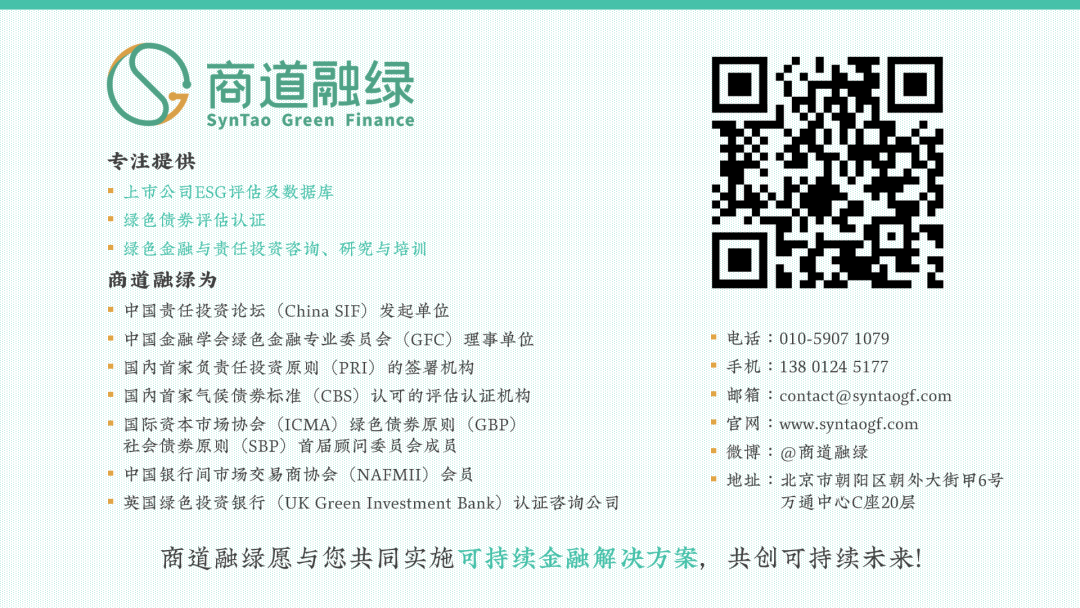SynTao Green Finance welcomes the Exposure Draft IFRS S1 General Requirements for Disclosure of Sustainability-related Financial Information (General Requirements Exposure Draft) and Exposure Draft IFRS S2 Climate-related Disclosures (Climate Exposure Draft). We believe that this work will help to develop a set of more complete, consistent and comparable standards of financial disclosure relating to sustainability on a global basis.
Our response is outlined below.
I. Including perspectives of more stakeholders (potential users of sustainability-related information) other than those of investors only
At present, with regard to the users of disclosed information, the General Requirements Exposure Draft places particular emphasis on the "primary users of general purpose financial reporting", i.e. "existing and potential investors, lenders and other creditors". This reflects that the IFRS has focused on the financial perspective when developing the IFRS Sustainability Disclosure Standards. However, the history of ESG development shows that a single financial perspective is not sufficient and that regulatory and social perspectives should also be considered. Therefore, we propose that “key stakeholders” should also be considered as potential users of relevant information. A "key stakeholder" is a stakeholder who is likely to have a significant impact on the value of the business or whose interests can be significantly influenced by the business. The inclusion of a “key stakeholder” perspective can help companies to identify material issues more completely.
II. Balancing information about sustainability risk and opportunities
The IFRS Sustainability Disclosure Standards are to cover sustainability-related information of both risk and opportunity aspects, while, give much prominence to risk information in its specificity. For example, in the General Requirements Exposure Draft, the table of contents only contains a section on "Risk Management". We believe that, from a more balanced perspective, the IFRS Sustainability Disclosure Standards should take into account both risk and opportunity, with a balanced and fair view between the two. Some information users look more at the risk information, while others at the opportunity information. We would recommend the section "Risk Management" to be renamed "Risks and Opportunities Management" in the General Requirements Exposure Draft.
III. Constructing the global benchmark standard based on global consensus
The IFRS Sustainability Disclosure Standards aspire to be a global benchmarking standard. We believe that a global benchmarking standard should be built on the premise of global consensus and avoid incorporating some non-global consensus into the IFRS Sustainability Disclosure Standards. Otherwise, it would undermine the technical foundation for the IFRS Sustainability Disclosure Standards to become a global benchmarking standard. In particular, the Appendix B of Climate Exposure Draft cites a large number of sustainability-related standards and initiatives. Some of these standards and initiatives are not globally adopted or globally benchmarked and, if not properly referenced, may affect the ability of the IFRS Sustainability Disclosure Standards to serve as a global benchmarking standard. We recommend that the Appendix B be carefully reviewed and only include standards and initiatives if they have been endorsed by the UN, World Bank, IMF and G20. If the review takes a long time, we suggest that the inclusion of Appendix B be temporarily postponed.
We agree that disclosing industry-based indicators is a technically practical and feasible approach. Currently, the Appendix B is only used in conjunction with the Climate Exposure Draft. However, in practice, the Appendix B also contains indicators for a number of other sustainability issues. Therefore, we suggest that the Appendix B may be used in conjunction with both the General Requirements Exposure Draft and the Climate Exposure Draft of the IFRS Sustainability Disclosure Standards.
IV. Recommendations for the step-by-step application of IFRS Sustainability Disclosure Standards across different jurisdictions
The development of sustainability disclosure varies from jurisdiction to jurisdiction, as does the ability to apply IFRS Sustainability Disclosure Standards. In practice, sustainability disclosure can be implemented in a step-by-step manner along the technical path of "voluntary - comply or explain - partially mandatory - fully mandatory", so as to form reasonable market expectations and effectively guide issuers to gradually enhance their capabilities. While IFRS will not require jurisdictions to apply the ISSB standards on a mandatory basis and it will be up to the discretion of the authorities in each jurisdiction to determine whether and how to apply the ISSB standards, IFRS may describe these steps and pathways for jurisdictions to implement the ISSB standards in a step-by-step manner. We believe that the inclusion of such descriptions could help jurisdictions to better and more orderly apply the IFRS Sustainability Disclosure Standards.
About SynTao Green Finance
SynTao Green Finance (STGF) is one of the first Chinese organizations specializing in providing green finance and ESG responsible investment services, starting ESG data collection and research as early as 2009. STGF ESG data and research on ESG key issues are widely employed to support investment decisions, risk management, policy making, and sustainable finance product innovation. STGF STαR ESG Database and STGF ESG Risk Radar System cover all A-share market, and Hong Kong stocks in the stock connect schemes, amounting to 5,000 listed companies. In 2020, STGF launched the STGF PANDA Climate Data Platform, providing carbon emission data of Chinese entities based on GHG protocol. STGF ESG ratings (SynTaoGF-ESG) have been onboarding on Bloomberg Intelligence, making it the first Chinese ESG rating agency to have its data displayed on Bloomberg.
STGF is the first signatory of Chinese service provider joining PRI, a member of the first Advisory Council of Green Bond Principles and Social Bond Principles of International Capital Market Association (ICMA), the founding member of China Green Finance Committee, the first China-based Climate Bonds Standard (CBS) approved verifier, a member of the National Association of Financial Market Institutional Investors (NAFMII).
